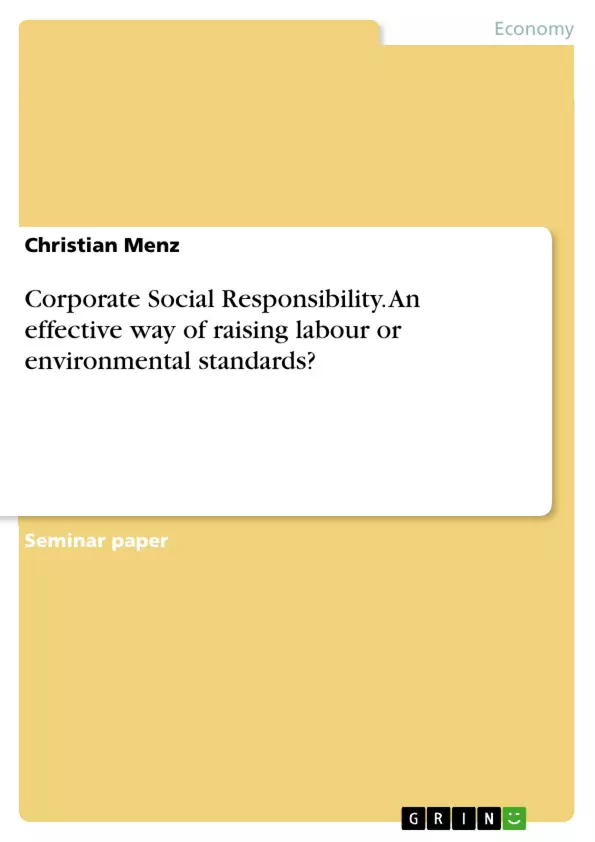For the non-binding character of private CSR regulation and MNCs’ substantial resources to shape employment (for the better or the worse) in their subsidiaries, I argue that a necessary precondition for CSR policies to be effective, that is to raise working standards substantially and sustainably, consists in firms’ serious commitment to its enforcement and that firms’ level of commitment will be determined mostly by economic imperatives. However, CSR policies will only be sufficient to improve working conditions in combination with their ‘embeddedness’ in a particular political and institutional context that is conducive to solve technical problems (e.g. regarding monitoring, governance of supply chains) and that enables labor to manipulate potential conflicts of interest between financial and social priorities in favor of of the latter.
Inhaltsverzeichnis (Table of Contents)
- Introduction
- Main determinants of CSR effectiveness
- Conclusion
Zielsetzung und Themenschwerpunkte (Objectives and Key Themes)
This paper examines the effectiveness of Corporate Social Responsibility (CSR) in raising labor and environmental standards. It explores the motivations and limitations of CSR policies, particularly within the context of global value chains and production networks.
- The role of economic imperatives in driving CSR adoption.
- The impact of market sanctions and reputational effects on CSR practices.
- The significance of institutional context and multi-stakeholder approaches in promoting effective CSR.
- The challenges of enforcing CSR standards in the face of global competition and labor market dynamics.
- The potential for CSR to both enhance and undermine social goals depending on its implementation and motivations.
Zusammenfassung der Kapitel (Chapter Summaries)
- Introduction: This chapter sets the stage by discussing the impact of globalization on multinational corporations (MNCs) and their labor practices. It introduces the rise of CSR as a form of private regulation in response to concerns over MNCs' social and environmental performance.
- Main determinants of CSR effectiveness: This chapter delves into the key factors influencing the effectiveness of CSR policies. It explores the interplay of economic incentives, market forces, and institutional contexts in shaping CSR outcomes. The chapter also examines the limitations of CSR, particularly in addressing labor issues within global value chains.
Schlüsselwörter (Keywords)
Key terms and concepts explored in this paper include: Corporate Social Responsibility (CSR), global value chains, production networks, labor standards, economic imperatives, market sanctions, reputational effects, institutional context, multi-stakeholder approach, trade unions, International Framework Agreements (IFAs), and globalization.
Frequently Asked Questions
What is the main argument regarding CSR effectiveness?
Effective CSR requires a serious commitment to enforcement, driven by economic imperatives and embeddedness in a supportive political and institutional context.
How do economic imperatives influence CSR?
Firms are more likely to adopt and enforce CSR policies when they face market sanctions, reputational risks, or when social standards align with financial priorities.
What is the role of global value chains in CSR?
Global value chains complicate CSR enforcement because multinational corporations (MNCs) often lack direct control over working conditions in distant subsidiaries or suppliers.
Can CSR replace traditional labor regulation?
The paper suggests that while CSR is a form of private regulation, it is most effective when combined with institutional frameworks like trade unions and international agreements.
What are International Framework Agreements (IFAs)?
IFAs are instruments negotiated between MNCs and global union federations to ensure minimum labor standards across all operations of a company.
- Quote paper
- Christian Menz (Author), 2012, Corporate Social Responsibility. An effective way of raising labour or environmental standards?, Munich, GRIN Verlag, https://www.grin.com/document/232010



